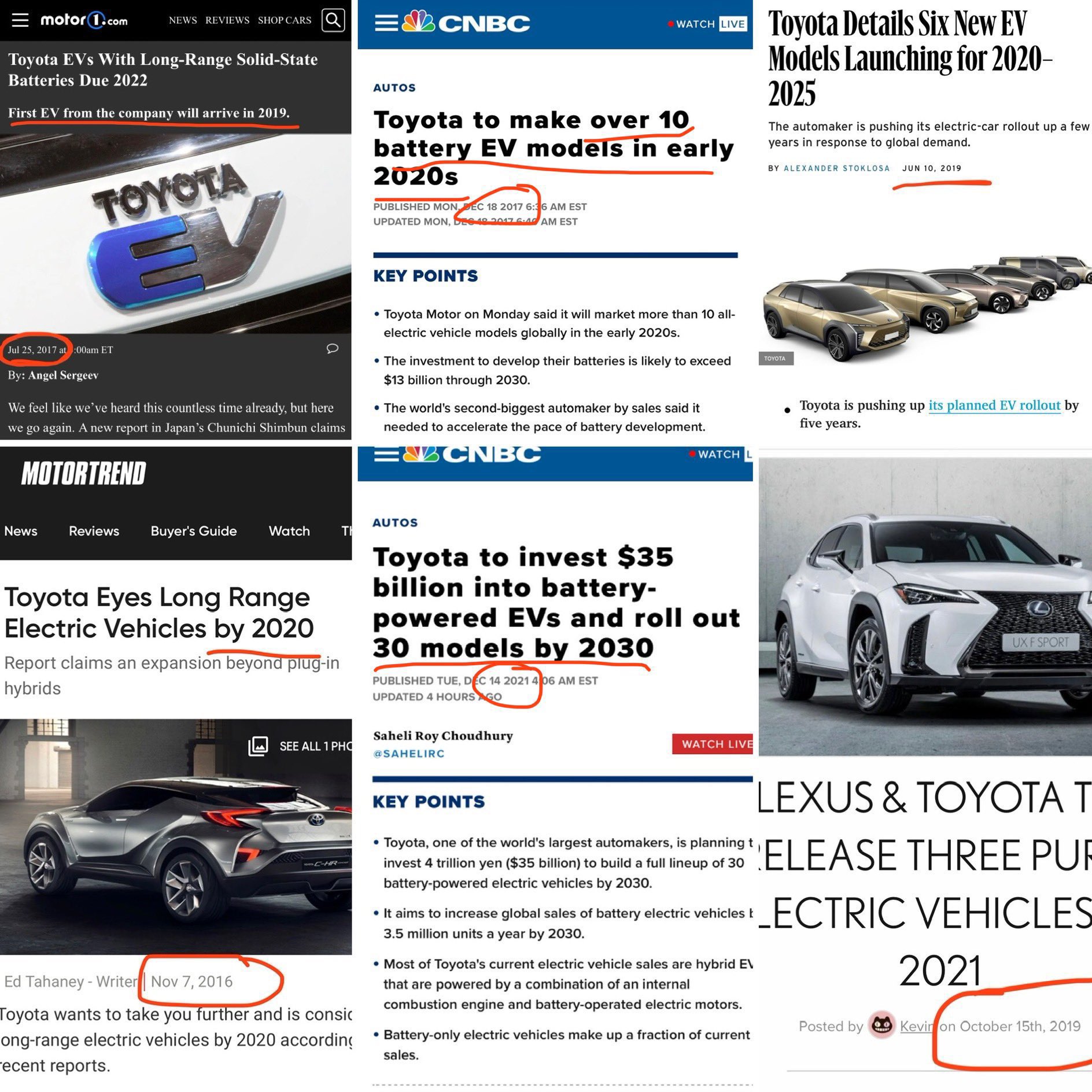Repost of a my previous comment on this elsewhere:
They have been “claiming”/ “announcing” this breakthrough since 2017 repeatedly. They STILL haven’t figured out how to mass produce it affordably to make it meaningful. They keep pushing out the date for when it will arrive for many years now.

OP’s article first claims 2025 and then claims 2027.
As per the image in my post Toyota first announced this in 2017 with a target of 2022… They just keep re-announcing it saying it is coming in about 3-5 years.
Worth pointing out there was a global pandemic in the middle of that timeline
Add on top of the nature of these ultra capitalist worldwide corporations, even if they were able to mass produce this affordably that would mean decommisioning tens of millions in already existing production infrastructure. Why would they do that when they can delay next gen tech for greater profit?
mm totally! seems like a very “i’ll just wait for the next gen to buy an EV” kind of thing
… like, even if it’s possible it’s not possible… just the amount of energy required to be transferred into that battery wouldn’t charge in any existing charging infrastructure
Ya that is the other major point. Toyota doesn’t have a charging network, and they didn’t build out a hydrogen network for their hydrogen car.
So even if they have this battery it would not be able to do what they claimed in practical use.
Their hydrogen cars work fine… as long as you live in a tiny area in california and have no desire to leave it lol
And are willing to pay “more” for expensive hydrogen.
It’ll come out when Tesla releases Full Self Driving for real
I don’t think Tesla is going to be the one announcing that.
Just in time for the commercially viable cold fusion.
Was going to reference your post.
Toyota spoofing.
Except none of those are about battery tech, just vehicles. Solid state batteries are a real thing that have shown promising advances as of late.
The title of the one in the top right is “Toyota EVs With Long-Range Solid-State Batteries Due 2022”
Here is a whole article on them making these past claims with sources https://thedriven.io/2023/07/05/solid-state-batteries-toyota-has-history-of-talking-big-on-ev-breakthrough-but-not-delivering/
I’ll believe it when I see it.
bullshit
Very weird turn of events given that Toyota has a history of being anti-EVs.
Their announcements about products that are way better than anything that actually exists with no solid plans to actually bring it to market is actually just another flavor of anti-EV FUD.
It’s not the right time to buy an EV because our imaginary product is SO much better than any of those boring products, you should wait for it and keep buying our gas vehicles for now.
It’s depressing how cynical that is.
It’s depressing because its probably true and even if Toyota did create such a miracle tech, it would be insanely expensive to produce and thus purchase for the consumer. Not to mention with such an insane charge rate it would most likely never reach it due to the charge stations not supporting it and power infrastructure being unable to cope with such a load.
I was referring to Toyota’s strategy being cynical, not the comment.
Oh, Toyota’s strategy isnt Cynical, its a deliberate choice by the higher ups to champion hybrid, hydrogen and refuse to join in the EV party- its not some cynical idea that ev’s aren’t here to stay or wont take off.
They were pro hydrogen but I think they realized that ship has sailed and EVs are here to stay for now
I think they were pro-hydrogen, and now they’re using hydrogen as an excuse not to do battery EVs.
People who have heard of hydrogen cars but haven’t looked at how inefficient and expensive they are still think that they’re the future.
I swear every other week I see a new video claiming Hydrogen cars are the future, despite our current tech just being inadequate to give them enough range, and how unsafe they are- ontop of how 95% of the world has next to 0 infrastructure to fuel said hydrogen fuel cars.
That’s not to mention the costly & environmentally unfriendly production of hydrogen in the first place which at current production rates could never even if multiplied by multiple degrees- fully support a hydrogen majority of cars on the road.
Hydrogen Cars, the uncleanest, most unpractical and expensive “clean energy!” alternative fuel…
Most of hydrogen’s problems are solvable - we can pack a car with hydrogen tanks, make hydrogen with electrolysis, build infrastructure, etc.
The big killer is price. Those hydrogen filling stations aren’t $1000 each like home chargers or $50,000 each like DC fast chargers, they’re something like 2 million dollars each. And you need them everywhere, there’s no home filling to carry most of your usage.
The hydrogen you put in them? You have to pay for not just the electricity that makes it into your car’s electric motor, but all the energy that was wasted along the way:

Nobody’s looking to spend all that money on filling stations, and nobody’s interested in paying 2-3x as much to fill their car.
Yes, money is usually the answer.
So incorrect. Look at any major truck company (Volvo, Hyundai, Cummins, etc) and where the investments are. Grey hydrogen stations are getting funding all over, here’s one in my extremely conservative and shit province https://www.src.sk.ca/news/sask-going-blue-hydrogen-hub-will-promote-further-investment-province. If you ignore all the investments and growth in the sector then sure, it’s never gonna happen.
Toyota has historically been pretty conservative on tech changes. They were one of the last to move away from carburetors for example
Hmm, they were one of the first to mass produce hybrids, and the one of the first to try hydrogen. They must just have executives that really don’t like the idea of filling up slowly.
Something like 200 KWh. Charging that in 10 minutes would be along the lines of 1 MW. It’s roughly the output of a 50 metre diameter wind turbine. A medium sized nuclear power plant would only be able to handle around 1000 of those at the same time.
That’s an impressive feat but I doubt they expect the 10 mins to be practical. If they could implement this battery at good value it would be a game changer. Though the capacity seems much higher than most of us need so it makes me wonder what impacts on the environment it would have. As we all know, electric cars are better but are no saints with a somewhat competitive emission amount over its lifetime.
It’s roughly the output of a 50 metre diameter wind turbine.
So you’re saying that if we put a 50m wind turbine on the roof of one of those Toyotas, we’d have a car with infinite range?
This is dumb anyway - nobody is going to pump 1MW into a car, the grid can’t support it, never mind a supercharger-style station with between 8 and 20 plugs. A 20-plug Supercharger needs around 1.5MW to serve each station with 72kW.
And really, when I’m on a road trip, after 3h in the car, I need a break that’s long enough to hit the bathroom, grab a bite to eat, and stretch my legs. The car is usually charged to 90% in under 45 minutes anyway, even if I roll into the charging station at under 5%…
I’d expect a “Ultra-tier” fast charging station to have internal batteries (or perhaps supercapacitors or something like that) which buffer up from the grid. Eg. when not in use and over-night. Probably won’t last much into a day even with that, but we may see smaller buildings connected to charging stations that hold internal batteries to deliver faster charging than the connected grid can deliver.
As long as there is demand and profit to be made, it could happen. The biggest cost is of course the batteries, but if solid-state batteries turn into reality I think things might be more cost effective. Especially since fixed position batteries aren’t subject to the same contraints as car batteries. Don’t need to handle vibration, weight is not a big problem. Key goals are lifetime value, energy density + and (dis)charging rates.
Cheaper electricity during night might not be a thing everywhere or in the future, but small savings by stocking up cheaper during nighttime, gives better margins.
Assuming that this is for private vehicles, and not trying to set the stage for something like a freight truck.
Something like that might have a more reasonable demand for that 1MW, especially if they need massive batteries for interstate/international travel.
This would be useful for the logistics industry, especially the non-US logistics industry (though useful for short-haul there). There is a LOT of logistics that isn’t big-rig long-haulers.
Amazon would for sure buy millions at that range, as an example. That’s multiple days of use with overnight charging drawing it even longer.
…and also, such intensely fast charging might shorten the lifespan of the battery considerably? This is an impressive engineering feat, but most ICE cars get half that range per fill-up. Targeting that level with rapid recharge might be more realistic to make practical, and would still be a huge step forward in practicality for a lot of non-urban drivers.
No, you can’t see it.
She goes to another factory!
Really too bad it’s going to require a subscription and monthly fees to get it. And that’s after the car payment.
Puts our Mitsubishi Outlander PHEV’s 30km after a 5 hour charge to shame!
Same with my Ford Escape PHEV’s 60km after 10-11 hours at home (4ish hours on a level 2).
If there’s a vehicle manufacturer I can trust to make a reliable battery with that kind of performance, it’s Toyota… Buuuuuuuuuuuut, I’ll believe it when I see it.
So this battery is supposed to be: Half the weight AND half the volume AND half the price AND solid state!
And we are supposed to believe they can have that by 2025?
To charge for 745 miles, would require at least 150 kWh battery, meaning they’d have to charge at 1 MWh. AFAIK the most powerful chargers available today are about 750 kWh. So 1 MWh is possible. But very doubtful for a new solid state battery weighing and costing half of current batteries.
it sounds like they might be producing them for cars to be out in 2027
but… they’re also working on making the manufactoring “simplified” and cheaper than lithium-ion batteries
i dont assume that’ll be done by '27
so i expect… costs to be high for the first year or two, and possibly only available in a few (low volume) car models
but we’ll see.
i hope they do surprise us greatly. but i have been sceptical of toyota regarding electric… which is weird coz they were among the first to make hybrids
Reading the article again, it merely states Toyota expect to have solid state battery by 2017, which is quite underwhelming, considering BYD already sell cars with solid state batteries.
That’d make home charging practical. I want to believe–
Home charging is already practical (overnight); it’s the primary means people with electric cars charge them.
Except for people who live in apartments, basement suites, student dorms, etc.
So only people who can afford $1M detached houses and $60k electric vehicles can have personal transportation after 2030 or whatever the cutoff is for ICE vehicles now.
As someone who lives in an apartment who cannot charge their EV at home, charging at public 6.6/12kw and fast chargers is more than enough to keep my battery filled, sure its like 2~5x more expensive than charging at your own home, but it’s still like 4x cheaper than what I was paying in gas per month comparatively.
Yeah it can be done for some. Probably wouldn’t work for myself though as I have a 150km commute to work each day so probably would have to sit and recharge at a public station every second day if not more. So 2 hours of commuting turns into 2.5+ hours.
Yea, its still unfeasible for many people with long drives to work or school- or infrastructure around them which isn’t fast enough or built at all.
The newest and best offers for sale nowadays could probably suit you- 300mi/480km~ is pretty common nowadays and the Ioniq 5/Ev6 charge back up to near full in about 30~ mins. But those cars are out of reach for anyone out of middle income/higher middle income.
Right (and I knew as soon as I hit reply I should’ve phrased it better). What I mean is home charging becomes more attractive and useful. If you can charge in 10 min at a house it lessens the need for dedicated fueling stations. If we can quickly charge at (someone’s) home we don’t need gas stations.
Well, unless you want to go on long distance trips or wont be home for multiple days on end.
I wonder if a Mad Max sequel will focus on solar powered combat cars that struggle to cross vast distances under radioactive clouds…
If they could do it off of regular 120/240v they should just add charging plugs to all street lamps and charge electric vehicles a tax for power usage wether it’s public or private based off milage which also covers wear and tear on roads like the gasoline taxes do.
I’d be down for that. I’m sure it’d be called socialism though and we’d be stuck with the traditional gatekeepers. 🙄
I’m really sad that the gatekeepers go around unplugging electric cars, instead of trying to cut the ccharging cables while charging.
Cause that would very quickly be come a self correcting problem
At my place of work we’ve got one charging station. There’s a guy who parks his truck there every morning (comes in way early for some reason). He could park anywhere, even more convenient spaces, but always chooses that spot…So if you want to charge, good luck.
He literally sacrifices his morning, to come in super early, just to park his truck in the one charging station to fuck over someone with an EV.
That is the tiniest dick energy I’ve ever seen, lol.
This is why EVs remain a poor choice for people who drive long distances regularly.
True, though I’ll maintain most people aren’t those people, even though they might feel like they are
No it wouldn’t. Battery tech isn’t the limitation on home charging speed at all. It’s the power available at your house that limits charging speed.
This tech would only help cars charge faster at dedicated charging stations.
I dont think there’s a single dedicated charging station in the world that supports that speed of charging either.
Well duh the vehicle and battery doesn’t exist yet, so of course their aren’t any chargers! The charging standards will have to be developed concurrently with the vehicle and deployed slowly over years.
Most countries in the world’s entire electrical grid wouldn’t be able to handle a full ev-ification of the nation’s cars as is- let alone replacing every single one of those cars with chargers that suck enough energy to charge 3~ of the normal modern ev’s range (250mi~) in 10 minutes (2x faster than the fastest modern evs) at once.
It would be taking a problem we already don’t have infrastructure to solve yet- and tripling it.
And increasing the power available to every house, lamp post and car park is a big problem. It requires more investment than most utility companies are willing/able to make
Well that sucks.
Not really home charging times aren’t really a problem. You do don’t refuel a fossil fuel car at home.
The perception for me and maybe others is, I’ll drive somewhere and not be able to charge my vehicle unless I’m at home. That said, if a battery can last fricken 700 miles it’s a moot concern.
More and more places with electric car charging are available. Eventually we will replace gas stations with them. This strikes me as being far from reality and narrow minded at the same time. Maybe it’s different where you live?
Probably. I live in the South where trucks are more common than sense.
Riiiiight.
Toyota is so far behind in the EV game that they are throwing out BS claims to give people pause who might be considering a purchase from all the other companies viable EVs right now. This is like 15 and 20 years ago when car makers were saying that their hydrogen cars were just a few years ago… which of course never materialized, but they used it as publicity stunts.
Typical tabloid battery rubbish…
745 miles, assume 5 miles/kwh which is not unreasonable. That’s a 3.7Mwh battery (which my back of the envelope calcs would weight about 5 tonnes).
Charge that in 10 minutes you’d have to feed it from a 22Mw charger. So the output of a decent size offshore wind turbine. Per charger.
I haven’t got a clue how bloody heavy the connector would have to be… it wouldn’t be CCS, I can tell you that…
I find it funny how the media has just regurgitated their bullshit with essentially zero fact checking. This stuff is just outside the understanding of most people that they might not question it. To them this is Toyota making these claims. The company that made the '95 Camry which has been passed around to various family members and rolled up 300k miles. They trust Toyota. Maybe a little too much.
















